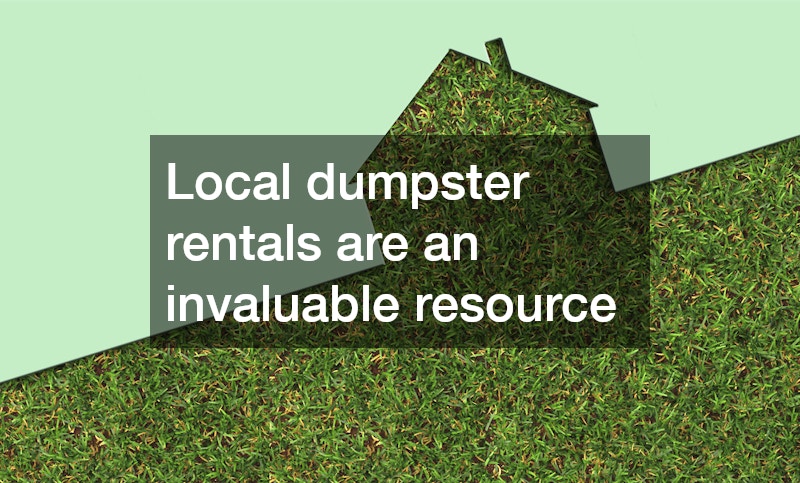When tackling renovation, construction, or major cleaning projects, managing waste efficiently is crucial. Local dumpster rentals offer a convenient solution that helps streamline the disposal process, saving you time and effort. Whether you’re a homeowner planning a spring cleanout or a contractor managing a construction site, understanding how dumpster rentals work and how to choose the right service can make all the difference.
This complete guide will walk you through everything you need to know about local dumpster rentals, from selecting the right size to understanding the costs involved.
Assessing Your Waste Disposal Needs
Before you rent a dumpster, it’s essential to assess your disposal needs accurately. Consider the type and amount of waste you expect to generate. Different projects necessitate different dumpster sizes; for example, small home cleanouts may only require a 10-yard dumpster, while larger construction projects might need a 40-yard container. An accurate estimate helps you avoid spending extra money on a larger dumpster than necessary or worse, running out of space mid-project. Keep in mind that certain items may need special disposal methods, so it’s crucial to communicate what you plan to dispose of with your rental company.
Choosing the Right Dumpster Size
Choosing the right dumpster size is one of the most critical decisions in the rental process. Common sizes include 10-yard, 20-yard, 30-yard, and 40-yard dumpsters, which cater to different project scales. A 10-yard dumpster is typically suitable for small projects like garage cleanouts. For medium-sized tasks, such as small remodeling projects, a 20-yard unit works well. Larger sizes are ideal when dealing with significant construction projects or complete home renovations. It’s advisable to consult with the rental company if you’re unsure, as they can help determine the appropriate size based on your specific requirements.
Understanding the Costs Involved
The cost of renting a dumpster can vary widely based on several factors, including size, rental period, and location. Most rental companies include the delivery and pickup fees in the total cost, but it’s always a good idea to clarify to avoid unexpected expenses. Keep in mind that exceeding the weight limit or extending the rental period beyond the agreed timeframe can incur additional charges. By planning carefully and estimating your project’s duration and waste production, you can keep costs down. Understanding these cost structures helps in budgeting effectively, ensuring a smoother waste management process.
Considering Environmental Regulations
When renting a dumpster, it’s essential to consider local environmental regulations. Some materials require special disposal protocols that rental companies must adhere to by law. Items like electronics, batteries, and certain hazardous materials should not be thrown into a general waste dumpster. By asking your service provider about prohibited items and following local guidelines, you ensure that your waste disposal practices are environmentally responsible. Additionally, some rental companies could offer recycling services for recyclable waste, which can further reduce the environmental footprint of your project.
Selecting a Reputable Dumpster Rental Company
Choosing the right dumpster rental company can significantly impact your project’s success. Look for companies with a solid reputation, transparent pricing, and excellent customer service. Reading online reviews and considering recommendations from locals can provide insight into a company’s reliability. Additionally, check if they adhere to environmental standards and offer flexible rental periods that match your project timeline. By investing time in selecting a trustworthy service, you ensure a stress-free experience, allowing you to focus on your project rather than worry about waste disposal.
Local dumpster rentals are an invaluable resource in managing waste for home improvements, construction projects, and large cleanouts. Understanding your waste disposal needs, selecting the right size, and comprehending the costs involved are key steps in the process. Additionally, considering environmental regulations and choosing a reputable provider further ensures efficiency and compliance. Working with a trusted provider can help you avoid hidden fees and ensure timely pick-up and drop-off. By taking the time to assess the requirements of your project, you can prevent unnecessary delays and frustrations. With proper planning and the right choice of service, dumpster rentals can simplify the waste management aspect of any project. They offer both convenience and affordability, allowing you to focus on your project’s success without the burden of dealing with waste. Embrace these insights to make your next endeavor both successful and sustainable, all while maintaining a clean, safe, and eco-friendly work environment.
.




